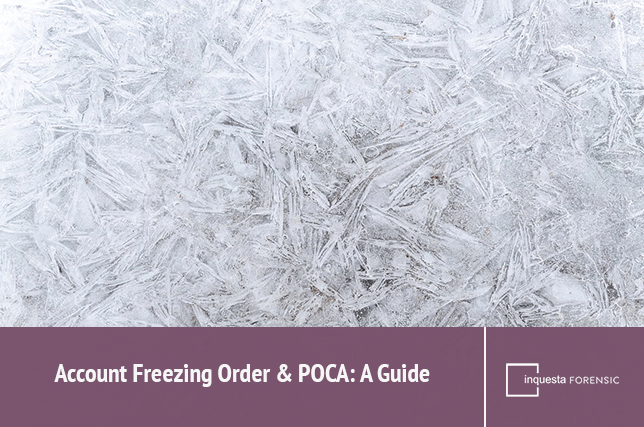In the pursuit of justice, the prevention of financial crime, and the preservation of the integrity of the country’s financial system, authorities in the United Kingdom can employ two legal instruments: Account freezing orders (AFOs) and the Proceeds of Crime Act 2002 (POCA).
Individually both measures can be useful in combating financial crime and illegally gained assets. However, together, these pillars constitute a highly effective, formidable, and all-encompassing system that disrupts criminal financial networks and ensures that these assets are brought into the open.
What is an Account Freezing Order?
An account freezing order (AFO) is a legal mechanism that enables authorities to legally freeze and potentially forfeit assets suspected of being linked to criminal activity. AFOs are primarily used in financial crime investigations and their specific terms can vary based on factors such as the extent of the crime and jurisdiction.
Account Freezing Orders were introduced as part of The Criminal Finances Act 2017, an amendment to the Proceeds of Crime Act 2002. This newer act was passed into law in order to give Magistrates’ Courts additional powers.
AFOs are a highly effective tool in the fight against financial crime. These orders are utilised by law enforcement agencies and financial regulators in order to attempt to disrupt criminal financial networks, deter money laundering and other forms of financial crime, and prevent the illicit flow of ill-gotten funds.
The actual specific procedures and requirements for obtaining and executing an AFO will vary from one country to another.
Account Freezing Order in the UK: The Process
Have you ever wondered exactly how authorities in the United Kingdom freeze and potentially even seize assets linked to criminal activity? The account freezing order process is essential in disrupting financial crimes, safeguarding the financial system, and preventing the use or movement of unlawfully acquired funds.
Key steps in the account freezing order UK process include:
- Reasonable Suspicion: The process starts with an assessment of whether there’s reasonable suspicion that certain assets are, in-fact, tied to criminal activ
ity.
- Application: When reasonable suspicion exists, law enforcement or relevant authorities apply to the courts for an AFO, presenting evidence in order to establish the suspicion of criminal activity.
- Review: It is of the utmost importance that an account freezing order is never used without just cause. As a result, the court will carefully review all applications to ensure the order is totally justified.
- Asset Freeze: If the courts grant the order, the relevant financial institution, usually a bank, is legally obligated to freeze all assets held in the specified account(s).
- Account Holder Notified: Account holders will generally be notified after the fact. This prevents them from withdrawing funds, with exceptions in cases where notification could jeopardise ongoing investigations.
- Forfeiture: Following further investigations and legal proceedings, if assets within an account are proven to be proceeds of crime, they could be subject to forfeiture.
A core understanding of the rules and intricacies of the process of an account freezing order in the UK is essential for both authorities and individuals that could find themselves affected by such orders.
Account Freezing Order Rules
The rules of an account freezing order will vary depending on jurisdiction and legal frameworks involved in the specific case. However, in the United Kingdom there are a number of key account freezing order rules in place in order to ensure that the process is carried out fairly and justly.
Rules and principles that must be followed in the account freezing order in the UK process includes:
- Pre-Application: As mentioned above, an asset freezing order must be based on a reasonable suspicion that the assets are linked to criminal activity, such as money laundering or fraud. Legislation states that if this suspicion is not present, an order will not be granted.
- Legal Oversight: Accountability and transparency are always at the forefront of the account freezing order process. The courts are responsible for providing thorough legal oversight and ensuring that an AFO is never issued arbitrarily/without sufficient justification.
- Extensions: An account freezing order in the UK is only granted for a specified period of time. This duration will vary depending on the nature, severity, and complexity of the case. However, if necessary, it is possible for an extension to be granted in order to keep assets frozen for longer while an investigation is concluded.
- Challenge: Anybody who has had their account frozen has the right to challenge the order in court. This process allows them the chance to present evidence that corroborates their standpoint that criminal activity is not present or that the order itself is unjust.
Throughout the account freezing order process, there are a number of legal safeguards in place in order to protect the rights of all parties involved. It’s important to note though, that the rules and procedures regarding account freezing orders can evolve over time. For the most accurate and up-to-date information possible on an account freezing order in the UK, it’s advisable to consult a legal professional.
Account Freezing Order & POCA
The UK’s ongoing fight against financial crime and the unlawful acquisition of assets relies on two main pillars: the Proceeds of Crime Act 2002 (POCA) and account freezing orders (AFOs). These pillars work in tandem to disrupt criminal financial networks and prevent the easy disposal or transfer of unlawfully gained assets before due legal processes.
Ultimately, both account freezing orders and the POCA are integral components in the United Kingdom’s defence against financial crime. They work together, in tandem, to address different stages in the process of identifying, investigating, and seizing these assets that can be linked to criminal behaviour.
AFOs are the immediate response when authorities are suspicious of a person’s dealings. It will lead to assets being frozen, ensuring that they will remain intact and untouched during an ongoing investigation. ACOs act as the first line of defence, preventing criminals from easily accessing or transferring their funds.
On the other hand, POCA refers to the overarching legal framework in place. It sets the rules for identifying, investigating, and, if proven, the seizure of assets that are deemed to be the proceeds of crime. This includes assets unlawfully purchased or gifted. The POCA allows authorities to legally take official action against the assets acquired via criminal activities, even if the perpetrator has not been legally convicted.
For more information about the Proceeds of Crime Act, read our dedicated blog going into more details on the subject.
The relationship between AFOs and the POCA should be seen as a two-tiered approach. AFOs are the swift and immediate response to preserve assets during an investigation, while the POCA is the more comprehensive legal foundation in place to enable the eventual confiscation of assets. When used together, they form a cohesive system.
The two complement each other to provide a unified approach to combating financial crime. They ensure that all assets that could be linked to crime are identified, preserved while the legal process takes place, and if necessary, confiscated.
How A Forensic Accountant Can Help with an Account Freezing Order & POCA
A specialist forensic accountant can play a pivotal role in the Account Freezing Order and Proceeds of Crime Act 2002 processes. These financial experts bring a number of specialised skills to the table, skills which are instrumental in the investigation and presentation of evidence related to a financial crime.
The Inquesta Forensic Accounting team is adept when it comes to meticulous reviews of financial records, transactions, and accounts in order to detect irregularities and uncover evidence of clear financial wrongdoing. This expertise is invaluable in the AFO and POCA processes.
Additionally, forensic accountants can assess the overall value of assets suspected of being linked to criminal activity, a crucial step in calculating potential confiscation amounts under the POCA. Additionally, our team has significant experience when it comes to supporting the legal process as an expert witness.
We are equally adept at strengthening a prosecution’s case, or defending applications for forfeiture and proving that your funds are not the proceeds of crime.
Our expertise across investigation, assessment, compliance, and reporting, ensures that all financial investigations we assist on adhere to all legal requirements and regulatory standards. For advice and support with an account freezing order, POCA confiscations, and much more, you’re in the right place. Get in touch today.
This article was originally posted at Inquestaforensic.co.uk





